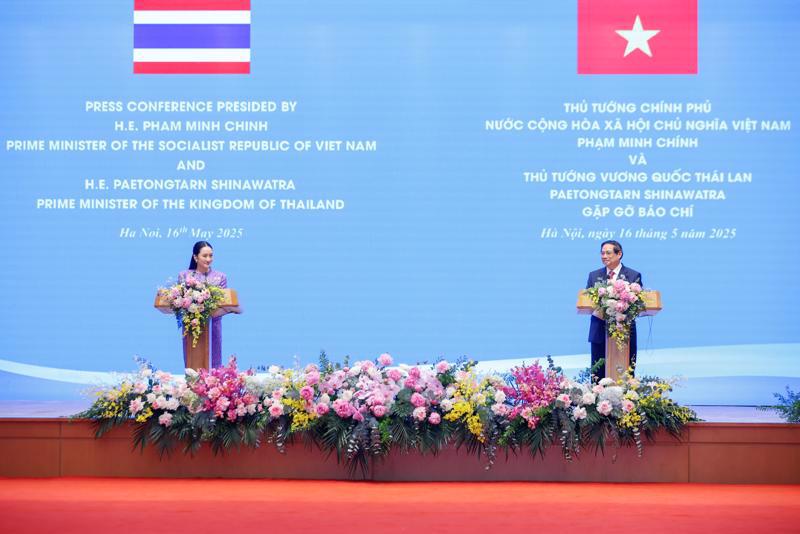Vietnam and Thailand have officially upgraded their relations to a comprehensive strategic partnership, heard a press conference co-chaired by Prime Minister Pham Minh Chinh and his Thai counterpart Paetongtarn Shinawatra in Hanoi on May 16, according to a report from the Vietnam News Agency.
PM Chinh told the press following the 4th Vietnam-Thailand Joint Cabinet Retreat the same day that the meeting took place successfully, stressing the two sides reached consensus on many key strategic orientations.
He noted that Thailand was one of the first ASEAN countries to establish diplomatic ties with Vietnam after Vietnam's national reunification. It is also the only nation with which Vietnam has established a joint cabinet meeting mechanism, initiated by Thai PM Thaksin Shinawatra in 2004.
Thailand was also the first ASEAN country to set up a strategic partnership with Vietnam in 2013, the leader continued.
The establishment of the comprehensive strategic partnership helps foster a peaceful and stable environment in terms of security and defence across ASEAN, Asia, and the world at large, the PM emphasized.
It also contributes to fast and sustainable socio-economic development in both Vietnam and Thailand, bringing greater prosperity and well-being to their people, he said.
The two sides agreed to promptly develop an action program to implement the comprehensive strategic partnership for 2025–2030, built on three key pillars.
Under the first pillar - partnership for sustainable peace - they consented to deepen political, defense, and security cooperation to help maintain a peaceful, secure, and stable environment in both countries and across the region.
Accordingly, they will enhance high-level exchanges, firstly preparations for a visit to Vietnam by the King and Queen of Thailand and a visit to Thailand by Party General Secretary To Lam at an appropriate time.
At the same time, the two countries will strengthen bilateral cooperation mechanisms, particularly the Joint Cabinet Retreat and the Joint Commission on Bilateral Cooperation. Notably, they will hold annual meetings between the two Prime Ministers in both bilateral and multilateral settings, and explore upgrading the defense policy dialogue and the high-level dialogue on crime prevention, suppression and security issues to the ministerial level.
They concurred to promote and expand cooperation in maritime security and safety, defense industry, logistics, military medicine, search and rescue, border management, and exchanges between military services and branches.
Both sides committed to enhancing joint efforts in combating transnational crimes, particularly drug trafficking, human trafficking, and cybercrime. They pledged not to allow any individual or organization to use their territory to undermine the other.
The sides agreed to step up coordination and exchanges on regional and international issues of mutual concern, emphasizing the importance of maintaining ASEAN’s solidarity, resilience, and unity in diversity, while upholding its centrality.
They also shared the view on the significance of preserving peace, stability, security, safety, and freedom of navigation in the East Sea, in accordance with international law, particularly the 1982 United Nations Convention on the Law of the Sea (UNCLOS). Both sides also pledged to push for the early adoption of an effective and substantive Code of Conduct (COC) consistent with international law.
For the second pillar—partnership for sustainable development—the two sides agreed to strengthen economic connectivity through the “Three-Connections Strategy,” which focuses on linking supply chains, businesses and localities, and sustainable and green growth strategies between the two countries.
Building on that foundation, the two sides will further facilitate each other’s import and export activities, aiming to raise bilateral trade to $25 billion in a balanced and sustainable manner.
They will also create more favorable conditions for businesses to access each other’s markets and expand investment, particularly in high-potential sectors such as clean energy, digital economy, green economy, innovation, and high-tech agriculture.
In addition, the sides will reinforce connectivity in transport infrastructure and logistics, particularly along the East–West Economic Corridor, to facilitate the movement of goods, services, and people between the two countries and across the region.
They will enhance cooperation in science and technology, innovation, and digital and green transformation across sectors, toward a low-carbon, net-zero economy.
Labor, employment, and social welfare cooperation will also be expanded, with both sides pushing forward the implementation of the agreement on recruiting Vietnamese workers to Thailand.









 Google translate
Google translate